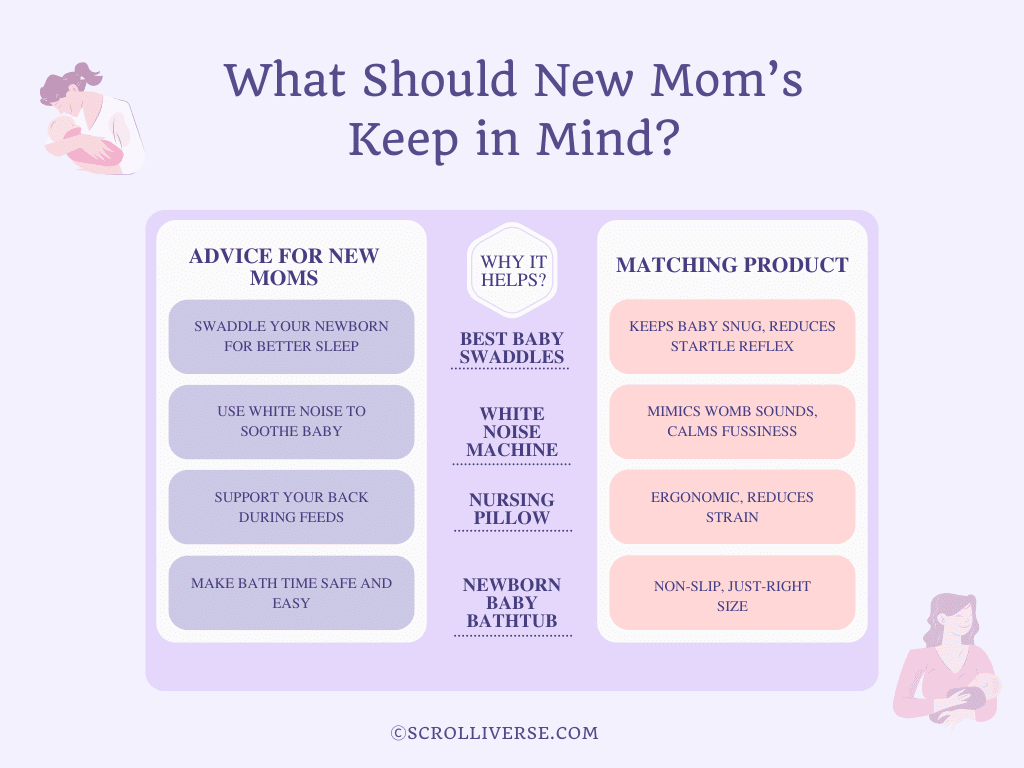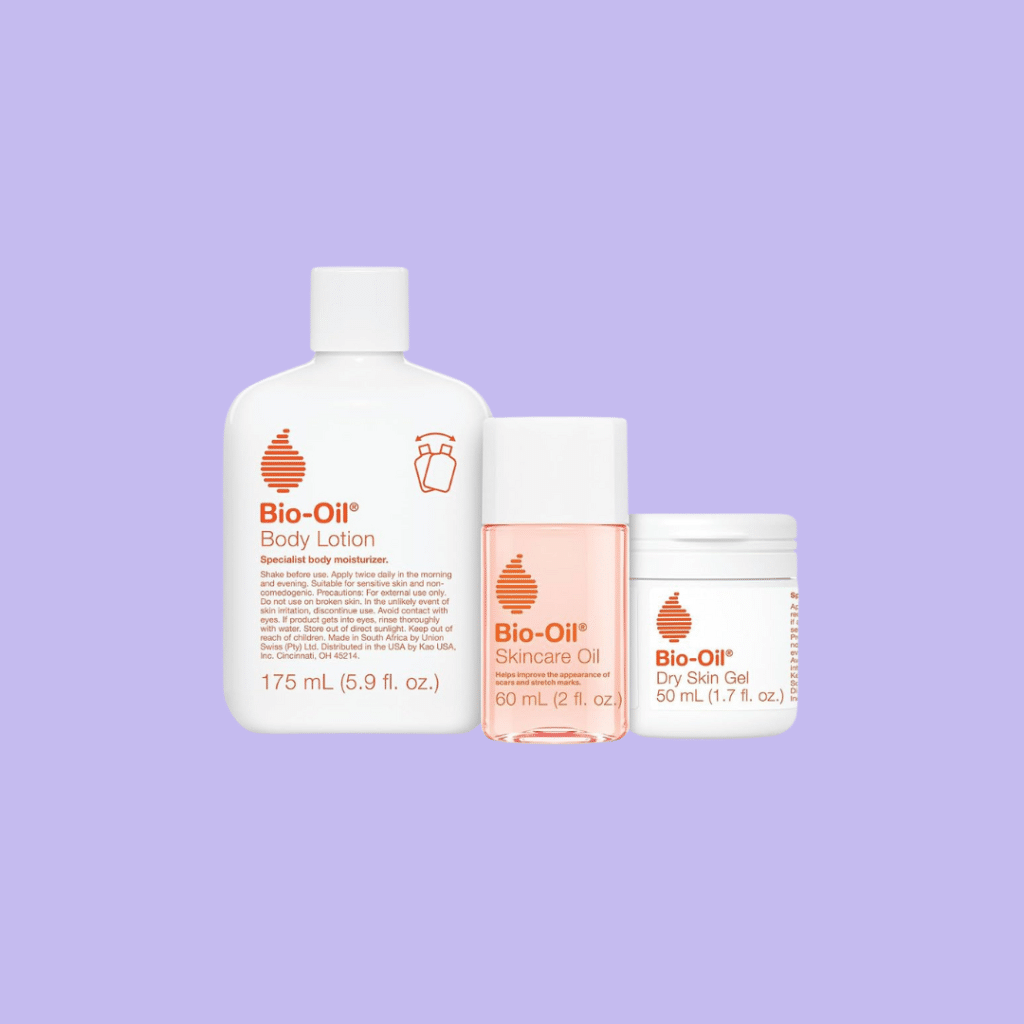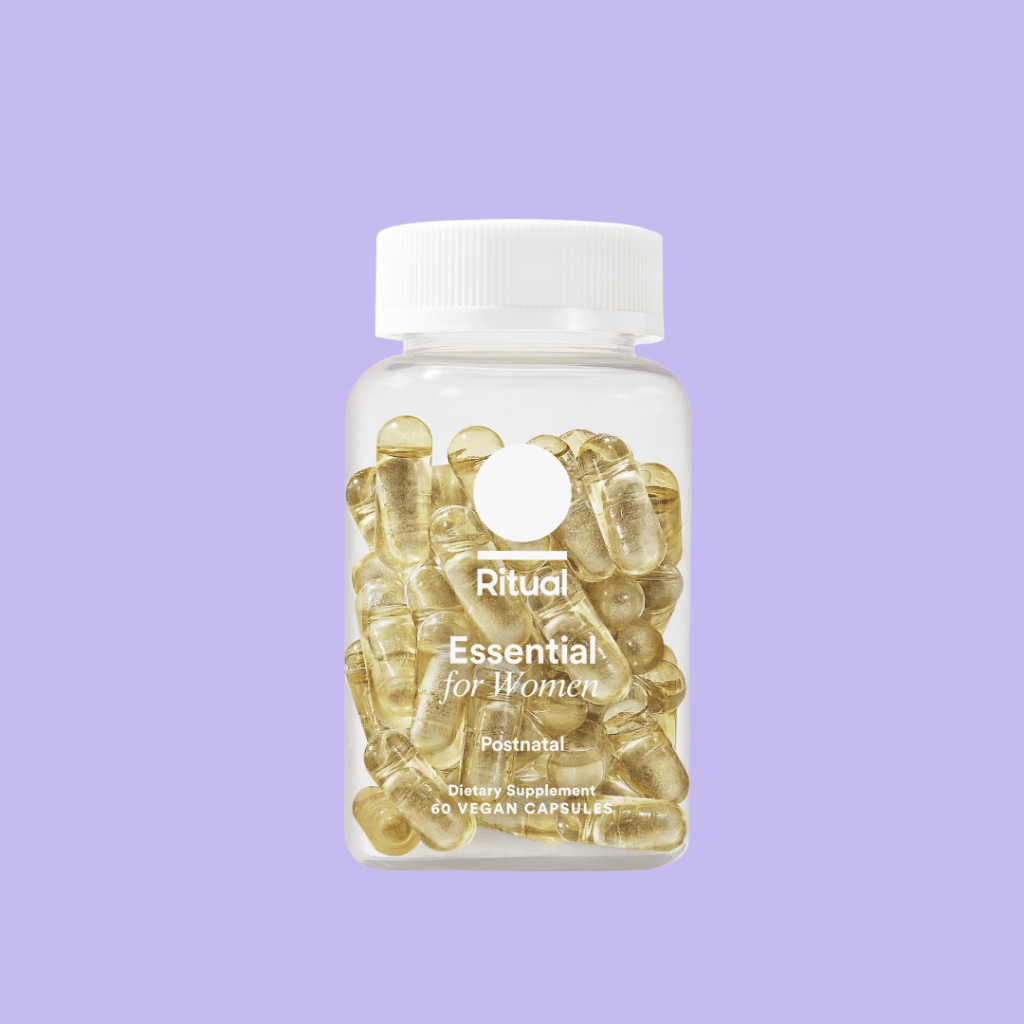Becoming a mom is beautiful—but also messy, emotional, and exhausting. This guide offers real advice for new moms to feel supported from day one. When my best friend had her first baby, she expected sleepless nights, adorable coos, and endless cuddles.What she didn’t expect was sitting on the bathroom floor at 3 a.m., quietly crying while her newborn wailed in the next room. I remember her calling me one day, her voice shaky:
“Why didn’t anyone tell me this part?”
That’s when I realized something—most people give new moms vague encouragement like “Enjoy every moment!”, but very few offer the kind of best advice for new mom that’s actually useful when you’re running on two hours of sleep and trying to figure out why your baby won’t stop crying.
Over the years, I’ve seen several friends and family members go through these early weeks, and I’ve paid close attention to what worked for them—and what didn’t. This guide is the result of their hard-earned lessons, the moments they wish they’d been prepared for, and the little tricks that made a world of difference.
Why Moms Should Get Advice (Even if They Think They’ve Got This)
I’ve noticed that some new moms feel like seeking advice means they’re admitting they can’t handle things on their own. But here’s the truth: getting advice isn’t a sign of weakness—it’s a smart way to prepare for one of life’s most demanding (and rewarding) roles.
The best advice for new mom moments aren’t about telling her she’s doing it wrong—they’re about offering a lifeline, a shortcut, or a little reassurance that she’s not alone in the struggle.
Here’s why it’s worth listening:
Skipping trial-and-error – I’ve seen friends save weeks of frustration by trying tips other moms already swear by.
Less stress, more calm – One mom learned a feeding trick in a single conversation that would have taken her weeks to figure out herself.
Feeling less isolated – Advice is often a reminder that her struggles are completely normal.
Discovering small but brilliant hacks – Like warming the baby’s wipes slightly in winter so diaper changes are less shocking.
Perspective on the hard days – Sometimes the best advice isn’t a practical tip—it’s a reminder that this phase is temporary.
💬 The truth? Every mom I know has figured out what works best for her, but advice gave her more tools to choose from when she needed them.
How to Prepare for a Baby (Before They Arrive)

Let us first see what would be the best advice for relatively new moms.
I still remember when my cousin was expecting, she admitted that the hardest part wasn’t packing a hospital bag or preparing for labor—it was realizing she had no idea what daily life with a newborn would be like. She quickly learned that preparing before the baby arrives can make those first weeks far less overwhelming. Here’s a detailed guide based on what really helped her (and other new parents I know).
Create Multiple “Baby Stations” Around the House
Running to the nursery at 2 a.m. is the last thing you’ll want to do when you’re exhausted and holding a fussy baby. Setting up small baby care baskets in different rooms can save your sanity.
What to include in each station:
Diapers (at least 5–6 for quick changes)
Baby wipes
Diaper cream or balm
A change of clothes (onesie + sleeper)
Burp cloths or small towels
Hand sanitizer
💡 Pro Tip: Keep one in your bedroom, living room, and anywhere you spend the most time during the day.
Stock Up Smart (Not Just Big)
Many first-time parents buy tons of newborn-size clothes—only to find they’re too small in weeks. Babies grow fast, so buy a variety of sizes in advance.
Suggested clothing prep:
Newborn size – Just enough for the first month (6–8 outfits)
0–3 months – Your main stockpile for early months
Layering items – Cardigans, hats, socks for temperature changes
Sleepwear – Zippered sleepers make nighttime changes easier
💡 Pro Tip: Choose soft, stretchy fabrics for comfort and easy dressing.
Choose Quality Swaddles
A good swaddle can be the difference between a restless night and a long stretch of sleep—for both baby and parents.
Why they matter:
They keep babies feeling snug and secure, mimicking the womb
They prevent startle reflexes that wake babies up
Quality fabrics prevent overheating and allow airflow
Look for:
Velcro or zipper closures (easier than traditional wraps)
Breathable cotton or bamboo blends
Machine-washable materials
Pick the Right Diapers
It’s worth trying a few diaper brands to see what fits your baby best. Comfort, leak protection, and absorbency are key.
Diaper shopping tips:
Buy small packs at first until you know which brand works
Check for softness, stretch in the waistband, and leak guards
Consider eco-friendly options if that’s important to you
💡 Pro Tip: Keep a small stash in each size (newborn, size 1, size 2) to avoid last-minute store runs.
Learn Baby Basics Before Birth
A newborn care class can save you hours of confusion and anxiety once the baby is here.
What Exactly are Baby Basics?
Bathing and diapering
Feeding cues and positions
Burping techniques
Safe sleep practices
Calming and soothing tricks
💡 Pro Tip: In-person classes often let you practice swaddling and diaper changes on dolls—worth the hands-on experience!
Set Up a “Mom Station” (Self-Care Counts!)
The baby’s needs are important—but so are yours. Setting up a dedicated spot for your recovery and feeding times will make a huge difference.
What to keep in your mom station:
Water bottle (hydration is key, especially if breastfeeding)
Snacks (nuts, granola bars, fruit)
Phone charger
Nursing pillow or back support cushion
Blanket or shawl for warmth during night feeds
Entertainment (book, tablet, or even a remote for TV)
💡 Pro Tip: Keep your mom station stocked just like a baby station—ready for those long feeding sessions or middle-of-the-night wake-ups.
Mom Baby Care Products That Actually Help
When it comes to making life easier (and sweeter!) for both you and your little one, these tried-and-true favorites never disappoint: a comfy baby carrier for hands-free snuggles, a reliable baby monitor for peace of mind, a supportive nursing pillow to ease those long feeding sessions, and a gentle laundry detergent that’s kind to baby’s skin.
These mom baby care products have been consistent favorites:
A comfortable baby carrier
A reliable baby monitor
A supportive nursing pillow
Gentle laundry detergent
But let us learn more about some of the much used products for our very new moms!
Maternity Skincare
Bio-Oil Skincare Set

Credit: amazon.com
What's in it for New Mom's?
Travel-size kit with skin care oil, dry skin gel, and ultra-light lotion. Helps improve the look of scars and stretch marks, hydrates dry skin, and works for all skin types.
- Scar & stretch mark care
- Dry skin gel
- Ultra-light lotion
- Face & body safe
- Non-pore clogging
Postnatal Nutrition
Ritual Essential for Women Postnatal Multivitamin

Credit: amazon.sg
What's in it for New Mom's?
The Ritual Essential for Women Postnatal Multivitamin is your nutrient boost for the months after baby arrives.
- 15 key nutrients
- Omega-3 DHA & choline
- Delayed-release capsules
- Third-party tested
- Allergen-free
Pregnancy Keepsakes
Ifeolo Pregnancy Tracker Board
Credit: amazon.com
What's in it for New Mom's?
The Ifeolo Pregnancy Tracker Board turns your baby’s growth into a visual countdown you can enjoy every week. From 5 to 40 weeks, see your little one’s size compared to fruits and veggies; it’s fun for the whole family and makes a charming keepsake for parents!
- Tracks weekly growth
- Visual fruit & veggie sizes
- Family bonding tool
- Gift for new parents
- Pregnancy keepsake
Facts About Newborns You Might Not Know
Every mom I know has been surprised by at least one of these—because no matter how many books you read, the real-life quirks of newborns are something else entirely. These little humans are fascinating, and understanding their unique traits can make those early weeks feel a little less mysterious.
Their eyesight is up close and personal
Newborns can only see clearly about 8–12 inches in front of them
That’s just the right distance for gazing into your eyes while feeding
This closeness helps with bonding and early emotional connection
They sleep… a lot (but in tiny chunks)
Average 16–18 hours of sleep a day
Comes in short bursts because their stomachs need frequent refills
Sleep stretches gradually lengthen over the first months
Crying isn’t always about hunger
Crying is a newborn’s only way to communicate
Can signal hunger, discomfort, a wet diaper, overstimulation, or just wanting to be held
Learning their different cries takes time—don’t feel pressured to figure it out instantly
A little weight loss is normal
Most newborns lose up to 10% of their birth weight in the first few days
They usually regain it within 1–2 weeks
This is a normal adjustment as they adapt to feeding outside the womb
💡 Extra Resource: For more detailed, medically reviewed information, check out HealthyChildren.org from the American Academy of Pediatrics—it’s one of the best trusted sources for new parents.
Baby Bathing Tips (Newborn Edition)

Credit: myexpertmidwife.com
Bathing a newborn is a whole new skill—friends have described it as “holding a slippery jellybean while trying not to panic.”
Tips from moms I know:
Use lukewarm water—test it on your wrist.
Keep one hand supporting the head and neck.
Start with the cleanest areas and work down.
Keep baths short, just 5–10 minutes.
Always pat dry, especially in skin folds.
📖 See Mayo Clinic’s baby bathing guide for more safety tips.
Things to Do with a Newborn
The moms I’ve seen thrive in the early days don’t just focus on survival—they find small ways to connect and bond:
Skin-to-skin contact – Calms the baby and boosts their sense of security.
Talk, sing, and read – Even if they don’t understand, they love hearing your voice.
Gentle tummy time – Helps build neck and shoulder strength.
Sensory walks – One mom would walk around the house pointing out colors and textures.
Capture little moments – Write down the funny sounds, first stretches, or sleepy smiles. Using a cozy, soft towel after bath time can make these moments even sweeter—if you’re looking for great options, here’s a helpful guide to the best baby towels.
Baby Skincare Tips
Friends have learned that newborn skin is delicate and needs extra care:
Moisturize right after baths.
Avoid products with fragrance.
Wash new clothes before the baby wears them.
Keep their nails short to avoid scratches.
Best Newborn Baby Tips from Real Moms I Know

Credit: uhhospitals.org
When I first started talking to other moms about newborn life, I quickly realized the best advice wasn’t coming from books or blogs—it was coming from women who’d been there, done that, and still had spit-up on their sweaters (which is why a stash of good burp cloths is a lifesaver). These are the kind of tips you get over coffee at the kitchen table, or whispered while rocking a fussy baby at 2 a.m. They’re simple, they’re real, and they make those first few months feel a little less overwhelming.
“Don’t compare your baby to others. Milestones happen at their own pace.” – Megan, mom of 1
Megan told me she wasted weeks worrying because her baby didn’t roll over as quickly as her friend’s baby. Now she knows—every little one has their own rhythm, and those charts are just guidelines, not deadlines.
“Buy twice as many burp cloths as you think you need.” – Tina, mom of twins
Tina swore she could do laundry in her sleep after the twins arrived. Between spit-up, milk dribbles, and mystery messes, she says you’ll go through burp cloths faster than you ever imagined.
“It’s okay to ask for help—even if it’s just someone holding the baby while you shower.” – Kathy, mom of 3
Kathy admits it took her until her third child to realize that asking for help isn’t a weakness—it’s survival. Even 20 minutes to yourself can reset your whole day.
💡 If I had to sum it up, it’s this: give yourself grace, stock up on the small things that make a big difference, and remember you don’t have to do it all alone. Newborn life is messy, unpredictable, and full of surprises—but that’s exactly what makes it unforgettable
Newborn Baby Health Care Essentials

Credit: healthline.com
Based on what I’ve seen, these make a big difference:
Book pediatric appointments early.
Keep a thermometer handy.
Learn infant CPR.
Track feedings and diaper changes—apps make it easier.
Feeding & Sleep Tips for New Born Baby
Here are some of the excerpts from friends’ experiences:
Feeding:
Feed on demand—newborns need frequent meals.
If breastfeeding is painful beyond the first minute, get professional help quickly.
Sleep:
Use a firm mattress and keep the crib clear.
White noise machines can work wonders for sleep.
Emotional Wellbeing: Caring for Mom Too
Every mom I’ve known has had moments of exhaustion and doubt:
Sleep when the baby sleeps—even if it means leaving laundry undone.
Keep healthy snacks nearby.
Don’t hesitate to talk to a doctor about postpartum depression—it’s more common than people realize.
Pros of Listening to Every Piece of Advice
Here is a look at some of the pros of advice for new moms’!
Learning from Others’ Mistakes
By hearing about the missteps others have made, you can avoid repeating them yourself.
It’s like having a shortcut to wisdom—you benefit from experience without paying the cost of trial and error.
Feeling Prepared
Gathering a variety of perspectives can help you anticipate challenges you might not have considered.
It can boost your confidence by giving you a wider range of potential solutions to draw from when problems arise.
Cons of Listening to Every Piece of Advice
Let’s take a closer look at some of the downsides of trying to follow every piece of advice you hear.
Information Overload
Too many viewpoints can make it hard to focus on what’s truly important.
This can lead to decision fatigue, where the sheer volume of input leaves you mentally drained.
Conflicting Opinions Can Cause Doubt
When advice from different sources contradicts, it can make you question your own judgment.
You might delay taking action because you’re unsure which path to follow, which can lead to missed opportunities.
Postpartum Recovery: What I’ve Seen Moms Wish They Knew
One thing I’ve noticed over and over: when friends were preparing for their babies, they stocked the nursery, read baby sleep books, and researched strollers… but few prepared for their own recovery. The postpartum period is often called the “fourth trimester” for a reason—your body and mind are still adjusting, healing, and finding their new normal.
Here’s what I’ve seen help most:
Physical Recovery
Rest is a necessity, not a luxury – I’ve watched moms push themselves too soon, only to slow down their healing. Even light housework can wait.
Perineal care matters – Whether it’s ice packs, witch hazel pads, or sitz baths, small comforts can make a big difference in healing after vaginal birth.
C-section recovery takes time – Friends have said the first two weeks were the hardest; avoid heavy lifting, keep the incision clean, and follow medical advice closely.
Hydration and nutrition – Healing bodies need fuel. Keep snacks like nuts, cheese, fruit, or protein bars within reach.
Emotional & Mental Wellbeing
Postpartum emotions are intense – I’ve seen women cry from joy, exhaustion, and everything in between—sometimes in the same hour. This is normal.
The “baby blues” are common – Many moms feel weepy or irritable in the first 1–2 weeks; this often fades.
Postpartum depression & anxiety are real – If feelings of sadness, hopelessness, or extreme worry persist, talking to a doctor or therapist is essential. One friend said it was the bravest thing she ever did.
Practical Support
Accept help without guilt – Whether it’s someone folding laundry, cooking dinner, or holding the baby so you can nap, take it.
Postpartum gear – Nursing pads, a supportive nursing bra, and a peri bottle for hygiene were mentioned again and again by friends.
Set boundaries – One mom I know made a “no unannounced visitors” rule for the first month, which gave her space to heal and bond with her baby.
💡 Friend’s Tip: “Your body just did something incredible. Give yourself the same grace and care you’d give your newborn.”
Wrapping it All Up
Summing up, if I could pass on just one best advice for new mom from all the women I’ve known, it would be this: trust yourself.
Motherhood is a mix of joy, chaos, and personal growth. Whether she’s figuring out things to do for newborn bonding, learning baby bathing tips newborn, or trying new baby skincare tips, she’s more capable than she thinks.
Every mom I’ve known has found her rhythm in time—and so will you.
Frequently Asked Questions
Let us answer some of our beloved moms’ queries!
How can I prepare my home before bringing my newborn baby home?
Set up baby stations, stock diapers, and create a mom-care corner.
What are the best newborn baby essentials every new mom should buy?
Diapers, swaddles, sleepers, burp cloths, carrier, nursing pillow.
How much sleep do newborns really need (and how can moms cope)?
16–18 hours daily in short bursts; nap when baby naps.
What are the best tips for postpartum recovery and self-care?
Rest, hydrate, eat well, accept help, and set boundaries.
How do I know if my newborn’s crying is normal?
Crying is normal; check basics first, call doctor if worried.




















Leave a comment